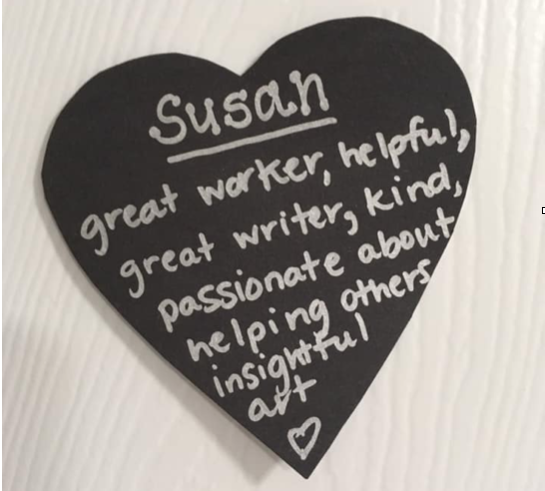Low Confidence Times
Recovery can often be a daunting time in a person’s life. They are announcing to themselves, their family, and maybe their friends, “I need help. I can’t do this alone.” When we feel most vulnerable, we tend to have the lowest confidence in ourselves. We may turn to friends, family, or the internet for help to build confidence in recovery when we need it most.
Confidence or Doubt
As I walked into work and settled in, I noticed a heart-shaped paper taped to the office door. Curious and intrigued, I saw my name at the top and read several beautiful, descriptive adjectives about me. What a pleasant surprise! Most of them I agreed with. The two most prominent words on the list were “great writer.” Multiple people have told me that I am a good writer; sometimes I believe it, and sometimes I have doubts.
A few times, I have reread pieces that I wrote years ago, and wondered, “Who wrote this? It’s incredible!” For a split second, I did not remember that it was me who wrote it. Rereading earlier writings is a confidence booster for me. When I struggle with writer’s block or lack confidence, however, doubt sometimes creeps in.
Confidence Challenges
What are some things that you find challenging to believe about yourself? Is there anything that other people tell you about yourself that you have a hard time accepting is true? Maybe you doubt your ability to stay sober and achieve your long-term goals. Perhaps you have been told that you are resilient, but you don’t feel that way when things look especially rough. It could be that you have compared yourself to another, using their success as your measurement. There are a few tips I use to boost my own confidence when I feel low. They might be helpful for you, too, especially if you need to build confidence in recovery.
Building Confidence
- Stop comparing yourself to someone else’s success. Compare yourself to yourself.
Theodore Roosevelt wisely said, “Comparison is the thief of joy.” Like in math, apples and oranges have no comparison. You and another are also not comparable. When I compare myself to someone else, I typically feel inadequate. Conversely, when I examine myself at a previous time, I gain confidence. I feel good about accomplishments, no matter how small. If you were able to shift your thinking to measuring yourself to yourself, what do you think would change? Can you see the progress you’ve made or the lessons you’ve learned and appreciate yourself just a bit more?
- Know your limitations.
I know I’ll never be a great writer to the likes of Stephen King, John Steinbeck, or Ernest Hemmingway. Of the three, my writing style is most like Hemmingway, minimalist, and usually leaves the reader filling in the details. Here’s where doubt resurfaces with many questions. Knowing that I will not write the next great novel is a relief and removes some of the unnecessary pressure. Maybe you haven’t been able to stay sober for long. Can you stay sober today? Yes! Now, repeat that process, and before long, the days add up to weeks, months, and years. Make your changes manageable.
- Know your cheerleaders and nurture those relationships.
Who’s in your corner? No one is ever truly alone, even though it might feel that way momentarily. Identify those that support you and cheer you on. Foster those relationships. My husband and daughters are my biggest supporters, especially when I feel uncertain. That doesn’t mean they only give praise. They also speak truthfully and help me see potential pitfalls. Who can you turn to for support?
- Write a gratitude list.
Believe it or not, gratitude changes your brain. In one study over 12 weeks, Berkley University mapped the brain activity of people who wrote a daily gratitude letter. They found that the learning and decision-making area of the brain was more activated than the guilt and fear center of the brain. Writing a gratitude list isn’t always as easy as it sounds. One list I wrote had the same item listed ten times because I couldn’t think of anything else. Most often, I am grateful for my family, health, nature, and compassion for others. What are you thankful for?
If you are looking for a new way to look at life and sobriety, Centered Recovery Programs can help. We use a mindfulness-based approach to heal the mind, body, and spirit. We believe there is no better time than right now to start–not just recovery from substance abuse, but recovery of your true self. Contact us today at 800.556.2966 to build confidence in recovery and beyond!
Susan Sanchez, MS, MSW Student
References
Bernal, S. (2016, June 8). How to overcome self-doubt: 8 tips to boost your confidence. Tiny Buddha. https://tinybuddha.com/blog/how-to-overcome-self-doubt-8-tips-to-boost-your-confidence/






